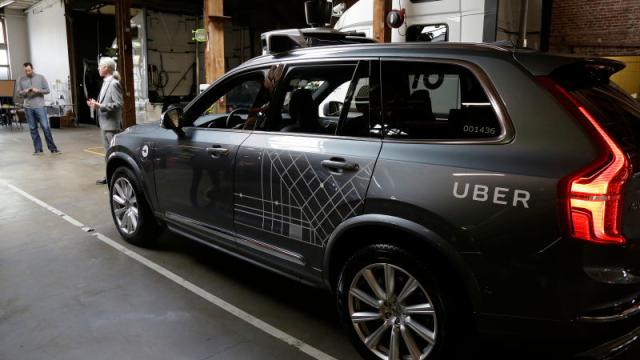Last night, Waymo, the self-driving car division of Alphabet — parent company to Google — filed a blockbuster lawsuit against Uber. The suit alleges that a former Google engineer stole trade secrets and proprietary designs of Waymo’s self-driving car system, which he subsequently used when starting his own company that was later acquired by Uber in 2016.
Image: AP
Specifically, the lawsuit alleges that Anthony Levandowski, a former employee in Google’s self-driving car division, downloaded nearly 14,000 documents, including the design for the circuit board used Waymo’s self-driving car system. All the while, the lawsuit claims, he was surreptitiously planning to leave the company to start his own self-driving car startup. Levandowski did end up leaving and starting his own company, known as Otto. Otto was acquired by Uber for $US680 ($886) million just a few months after its founding.
But this lawsuit, which our sister site Jalopnik dubs the beginning of the self-driving car wars, is just the latest wrinkle in the long, complicated history between Google and Uber.
Google and Uber used to be two companies that got along. In fact, back in 2013, Google Ventures, one of Alphabet’s investment arms, invested $US258 ($336) million in Travis Kalanick’s startup. In 2016, Google Ventures CEO Bill Maris confirmed to Bloomberg that it ended up investing more than $US300 ($391) million in Uber — making it Google Venture’s biggest investment ever.
Moreover, as a 2015 pivot of Waymo to move toward self-driving cars as a platform rather than a fully-built car, the closeness with Uber’s own self-driving plans have become even more pronounced. (The fact that it was reportedly developing its own Uber competitor in 2015 couldn’t have helped the relationship between the two, either.)
Uber’s self-driving ambitions are just as big, and back in 2015, it made its interest clear. CEO Travis Kalanick has spoken about the importance of being heavily involved in the self-driving car space. It’s not just a “nice to have” — Kalanick sees self-driving vehicles as the future of its business. The company launched its first fleet of autonomous cars in Pittsburg last summer.
Both companies would clearly like to become the big player in the self-driving car arena. And why wouldn’t they? They technology, while nascent, could be a huge future revenue driver.
Their relationship is further complicated by the fact that David Drummond, Alphabet’s chief legal officer and senior vice president of corporate development, was a member of Uber’s board of directors. In August, The Information reported that Drummond was being excluded from Uber board meetings over concerns of a conflict of interest between the two companies. Drummond eventually wound up resigning from the board. (Interestingly, Drummond’s resignation also coincided with the beta-test of an Uber-like service from Google company Waze.)
The conflict of interest between Uber and Google is also reminiscent of the battle between Apple and Google. Before Android declared war on iOS, the two were thick as thieves. In fact, Eric Schmidt, the former Google CEO (and current executive chairman of Alphabet), was a longtime member of Apple’s board of directors. But within two years, cracks started to appear as Android, Google’s mobile OS, started to compete directly with iOS. Schmidt resigned from his position on the Apple in 2009, after competition between Android and iOS reached a fever pitch.
And Google is no stranger to lawsuits alleging stolen trade secrets — usually, however, the company is being served. Back in 2011, for example, PayPal sued Google over stolen trade secrets, after Osama Bedier, PayPal’s mobile payment vice president, left PayPal to head up Google’s own Google Wallet initiative.
Still, what makes this Uber lawsuit so interesting is just how much money a Google company (Google Ventures) has invested in the company. Alphabet proper probably doesn’t care; $US300 ($391) million is a drop in the bucket to the company’s bottom line. Nevertheless, it’s like to put plenty of people working at Google Ventures in a tough spot. Expect this relationship to only get more complicated and contentious as both companies do their best to make self-driving cards a reality.
